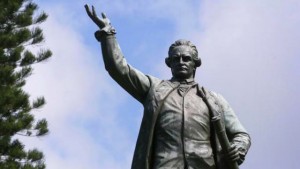Home » Commentary » Opinion » Getting Indigenous history right
· Ideas@TheCentre
 Before we start tearing down statues of Captain Cook and Governor Macquarie in a misguided attempt to atone for Australia’s racist past, we should get the facts straight about contemporary Indigenous Australia.
Before we start tearing down statues of Captain Cook and Governor Macquarie in a misguided attempt to atone for Australia’s racist past, we should get the facts straight about contemporary Indigenous Australia.
The political narrative behind the attempt to emulate the campaign in the United States to remove Civil War memorials is that Indigenous Australians still suffer racism, prejudice, and disadvantage due to the historic legacies of colonialism and dispossession — which the Cook and Macquarie statutes are said to symbolise.
White Australia does have a black history filled with many shameful episodes; the cumulative impact was to exclude and marginalise Indigenous people from mainstream society until at least well into the 1960s.
But since then — beginning with the end of the White Australia Policy in 1966 — attitudes to race, and the place of Indigenous people in the nation, have been transformed.
Even the ABC’s Indigenous editor, Stan Grant has acknowledged in his recent Quarterly Essay that most indigenous Australians now enjoy the ‘Australian Dream’ of the fair go and opportunity for all regardless of colour, caste or creed.
Hence, 80% of Indigenous Australians have the same employment, health, housing and other social outcomes as their non-indigenous peers, and mostly live in metropolitan areas, concentrated in south-eastern Australia.
By contrast, the 20% of indigenous people who are doing badly and have appalling social outcomes, live mostly in rural and remote areas.
These are the ‘homeland’ communities established in the 1970s under the policies of Aboriginal self-determination that addressed the legacies of colonialism and dispossession by enabling indigenous people to return to their traditional lands and live in traditional ways.
Trying to make up for our racist past through ‘separatist’ policies has ultimately made things worse. The minority of Indigenous Australians that live in the homelands have remained excluded from the freedom, equality, and prosperity that other Australians take for granted.
Knocking Cook and Macquarie off their pedestals won’t do anything to ‘close the gap’. It will simply reinforce the flawed kind of thinking about our history and its legacies that has ultimately led to misery and suffering for the most disadvantaged Indigenous Australians in rural and remote Australia.
Getting Indigenous history right